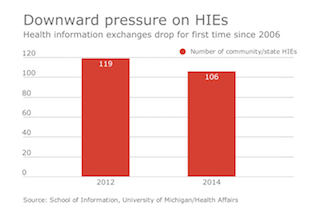 Spending on entitlement programs like Medicare and Medicaid consumes some two-thirds of all federal spending, but new research from the University of Notre Dame shows that information technology investments in health care lead to significant spending reductions — potentially in the billions of dollars...
Spending on entitlement programs like Medicare and Medicaid consumes some two-thirds of all federal spending, but new research from the University of Notre Dame shows that information technology investments in health care lead to significant spending reductions — potentially in the billions of dollars...
Julia Adler-Milstein
See the following -
An interoperability update: Do we need more carrots and sticks?
 Earlier this year, the ONC released the Trusted Exchange Framework and Common Agreement (TEFCA), which responds to a mandate included in 2016’s 21st Century Cures Act and lays out principles, terms and conditions on which to base an interoperability framework that healthcare organizations can embrace. “This means patients who have received care from multiple doctors and hospitals should have their medical history electronically accessible on demand by any other treating provider in a network that signed the Common Agreement,” said National Coordinator for Health IT Donald Rucker in a recent blog post. To achieve that goal, TEFCA is divided into parts A, the principles, and B, the terms and conditions, which is also where the rubber meets the road for many who live in the healthcare IT world...
Earlier this year, the ONC released the Trusted Exchange Framework and Common Agreement (TEFCA), which responds to a mandate included in 2016’s 21st Century Cures Act and lays out principles, terms and conditions on which to base an interoperability framework that healthcare organizations can embrace. “This means patients who have received care from multiple doctors and hospitals should have their medical history electronically accessible on demand by any other treating provider in a network that signed the Common Agreement,” said National Coordinator for Health IT Donald Rucker in a recent blog post. To achieve that goal, TEFCA is divided into parts A, the principles, and B, the terms and conditions, which is also where the rubber meets the road for many who live in the healthcare IT world...
- Login to post comments
EHR Systems: A Money-Loser For Most Physicians?
Adopting electronic health records appears to be a money-losing proposition for most physicians, especially specialists and those in smaller physician groups. Read More »
Epic Systems Feeling Heat Over Interoperability
Epic Systems' August decision to retain a Washington lobbyist was widely seen as a sign that the leading electronic health-record system vendor is feeling political heat based on the perceived lack of interoperability between its EHR systems and other systems.
- Login to post comments
Health Affairs Briefing at the National Press Club on Health IT Adoption & Use
National Coordinator for Health IT, Dr. Farzard Mostashari, delivered the opening remarks at the Health Affairs briefing on trends in the adoption of health information technology held this week at the National Press Club in Washington, D.C. Sharing 'open data' is prominent among the accumulating good news about the progress being made in adoption of electronic health record (EHR) systems across the U.S. Read More »
- Login to post comments
Health Information Exchanges Report Information Blocking
Despite widespread disapproval and Congressional scrutiny, information blocking remains a problem for health information exchanges working to connect providers and their EHR systems. Drawing data from a national survey of 60 HIE leaders, a new study by researchers at University of Michigan Schools of Information and Public Health found information blocking to be widespread and the policies in place to mitigate the practice ineffective...
- Login to post comments
Mother Jones piece hits Epic hard: 5 criticisms of the EHR vendor
For a company that is notorious for its lack of media interaction, Epic Systems often finds itself in headlines, for better or for worse. The latest Epic media storm was delivered by a Mother Jones piece in which the author criticized the vendor and the health IT marketplace as failing in its mission to help patients and save money through digitization. Author Patrick Caldwell wrote the healthcare industry has largely underachieved in its goal to digitize medical records and cut waste and costs associated with paper records.
- Login to post comments
Moving Past the EHR Interoperability Blame Game
As a researcher who studies electronic health records (EHRs), I’ve lost count of the times I’ve been asked “Why can’t the systems talk to each other?” or, in more technical terms, “Why don’t we have interoperability?” The substantial increase in electronic health record adoption across the nation has not led to health data that can easily follow a patient across care settings. Still today, essential pieces of information are often missing or cumbersome to access. Patients are frustrated, and clinicians can’t make informed decisions...
- Login to post comments
New Paper from American Medical Informatics Association Details How to ‘Cross the Health IT Chasm’
 The American Medical Informatics Association (AMIA) held a briefing today on Capitol Hill to unveil the findings and recommendations from a new paper, detailing ways that policymakers should focus on liberating data for patients, improving interoperability for clinicians, and enhancing the capacity for research and innovation to impact patient care. The paper, “Crossing the Health IT Chasm: Considerations and Policy Recommendations to Overcome Current Challenges and Enable Value-based Care,” is published in the Journal of the American Medical Informatics Association (JAMIA) in tandem with the briefing...
The American Medical Informatics Association (AMIA) held a briefing today on Capitol Hill to unveil the findings and recommendations from a new paper, detailing ways that policymakers should focus on liberating data for patients, improving interoperability for clinicians, and enhancing the capacity for research and innovation to impact patient care. The paper, “Crossing the Health IT Chasm: Considerations and Policy Recommendations to Overcome Current Challenges and Enable Value-based Care,” is published in the Journal of the American Medical Informatics Association (JAMIA) in tandem with the briefing...
- Login to post comments
Number of Public HIEs Drop, Bringing Viability into Question
 Despite federal funding that aided their creation, the number of community and state health information exchanges is declining as HIEs struggle to remain financially viable now that seed money has dried up. Those are among the results of a new national survey published in the July issue of Health Affairs that tracked community and state HIE efforts soon after federal funding ended. “We found 106 operational HIE efforts that, as a group, engaged more than one-third of all U.S. providers in 2014,” states the study’s authors...
Despite federal funding that aided their creation, the number of community and state health information exchanges is declining as HIEs struggle to remain financially viable now that seed money has dried up. Those are among the results of a new national survey published in the July issue of Health Affairs that tracked community and state HIE efforts soon after federal funding ended. “We found 106 operational HIE efforts that, as a group, engaged more than one-third of all U.S. providers in 2014,” states the study’s authors...
- Login to post comments
Study Shows Electronic Health Information Exchanges Could Cut Billions in Medicare Spending
- Login to post comments
The Fax of Life
When you walk into the Arlington Women’s Center, you see a spacious waiting room with artwork on the wall, maroon chairs, and a friendly receptionist sitting at the front desk. The obstetrics and gynecology practice serves a high-income suburb of Washington, DC. Framed photographs on the wall advertise the center’s physicians who’ve made lists of the city’s best doctors. It’s a modern, upscale doctor office. But when it needs to share patient records, it turns to an outdated technology: the fax machine...
- Login to post comments
The Meaningful Use Stage 2 Finish Line
Hospitals across the country have until September 30 to complete their 2014 reporting period for Meaningful Use Stage 2. Recently Ashish Jha and Julia Adler-Milstein published important articles in Health Affairs about the current state of EHRs and Health Information Exchange . What can we learn about the status of Meaningful Use Stage 2 across the country? Read More »
- Login to post comments
The Number Of Health Information Exchange Efforts Is Declining, Leaving The Viability Of Broad Clinical Data Exchange Uncertain
The diffusion of health information exchange (HIE), in which clinical data are electronically linked to patients in many different care settings, is a top priority for policy makers. To drive HIE, community and state efforts were federally funded to broadly engage providers in exchanging data in ways that improved patient care...
- Login to post comments
Health Affairs Briefing: Health Information Technology Adoption And Use
On Tuesday, July 9, Health Affairs will host a briefing to report latest trends in health information technology adoption among US health care providers and hospitals.
The event will feature remarks from Farzad Mostashari, the National Coordinator for Health Information Technology at the US Department of Health and Human Services, and coincides with the release of three Web First papers from Health Affairs, as well as the Robert Wood Johnson Foundation’s annual report on HIT Adoption. Read More »
- Login to post comments
ONC's 2nd Interoperability Forum
The Office of the National Coordinator for Health IT (ONC) is hosting the 2nd Interoperability Forum on August 6th- 8th, 2018 in Washington, DC. This event will bring people together from ONC, our federal partners, the healthcare industry, and the technology sector to: Learn about recent efforts to advance interoperability nationwide; Identify concrete actions in response to current interoperability barriers
- Login to post comments